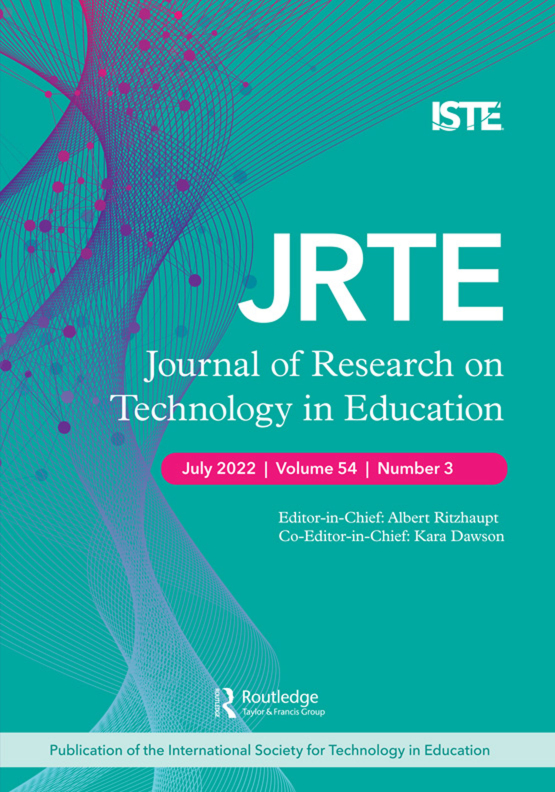Submit a Manuscript to the Journal
Journal of Research on Technology in Education
For a Special Issue on
Promoting PK-12 Teachers’ AI Competencies: Practices and Challenges
Abstract deadline
Manuscript deadline

Special Issue Editor(s)
Lehong Shi,
University of Georgia
ls77437@uga.edu
Jie Lu,
University of Georgia
jlu@uga.edu
Yue Yin,
University of Illinois Chicago
yueyin@uic.edu
Susan Stansberry,
Oklahoma State University
susan.stansberry@okstate.edu
Promoting PK-12 Teachers’ AI Competencies: Practices and Challenges
Artificial intelligence (AI) technologies are increasingly reshaping the PK–12 educational landscape, offering unprecedented opportunities for personalized learning, real-time feedback, automated assessment, and data-informed instructional decision-making (Luckin et al., 2022; Zawacki-Richter et al., 2019; Zhai et al., 2020). Meanwhile, PK-12 teachers, including pre-service teachers, face significant challenges when integrating AI into teaching, learning, and assessment, such as a lack of pedagogically grounded technological support, limited professional development opportunities, ethical concerns, and general hesitancy among teachers to embrace AI (Zhai & Nehm, 2023). These opportunities and barriers highlight an urgent and growing need to promote teachers’ AI competencies—the confidence and ability to clearly explain how AI technologies work and impact education, as well as to use them ethically and responsibly and to effectively communicate and collaborate with them in the educational setting (Chiu & Sanusi, 2024).
Teachers’ AI competencies are shaped by a complex interplay of psychological, pedagogical, and contextual factors (Benjamin & Dangwal, 2024; Ramnarain et al., 2024). Drawing on foundational work on competencies as the ability to perform tasks effectively and successfully (Parry, 1996; Falloon, 2020), recent scholarship emphasizes not only technical skills but also confidence, reflective capacity, and ethical responsibility (Chiu et al., 2024; Chiu & Sanusi, 2024). Zhou et al. (2025) expand this conceptualization by incorporating emotional aspects (e.g., interest, confidence) as they are directly tied to healthy and effective use of AI. They argue that AI competency also encompasses the capacity to continuously learn with and adapt to evolving AI technologies. Taken together, these perspectives suggest that fostering AI competency in teachers, including pre-service teachers, requires attention to cognitive and technical skills as well as affective and ethical aspects that are important for professional growth.
A growing body of literature highlights the importance of clearly defining and assessing teachers’ AI competencies. International organizations have developed frameworks that outline the key dimensions and components of these competencies (e.g., UNESCO, 2022; European Commission, 2022). Scholars have also developed and validated several instruments to assess teachers’ AI competencies, including the Teacher AI Competence Self-Efficacy (Chiu et al., 2024), the AI-PACK Survey (Lorenz & Romeike, 2023), and the AI Teacher Readiness Scale (Ramazanoglu & Akın, 2024). Research shows that teachers’ AI competencies improve after participating in AI-related professional development and coursework, however, many still face challenges in translating these competencies into classroom practice (Bae et al., 2024; Moorhouse et al., 2024). To this end, while defining and assessing teachers’ AI competencies is critical, it alone is insufficient to ensure effective and sustained AI integration in practice.
With the growing interest in integrating Generative AI (GenAI) into education, teachers’ AI competencies are continuously being conceptualized and refined. Promoting teachers’ AI competencies is becoming increasingly urgent for educational innovation. To meet this growing demand, there is a need for collective scholarly efforts to explore strategies that promote teachers’ ability and confidence to integrate AI into their pedagogical practice. This should include the capacity to critically evaluate AI applications, communicate and collaborate with AI-enhanced platforms, reflect on their instructional use of AI, and design or adapt AI systems in ethically responsible ways (Chiu et al., 2024). With sufficient AI competencies, teachers will not only be fluent AI users and adopters but also become effective producers and integration agents for innovative AI integration in dynamic educational contexts (Zhai, 2024).
Scope of the Special Issue: In light of the growing need for AI competency development among PK-12 teachers, including pre-service teachers, we invite submissions for this special issue in the Journal of Research on Technology in Education (JRTE). This special issue seeks to address this critical research need by collecting high-quality, evidence-based research that explores the practices and emerging challenges when designing approaches for advancing teachers’ AI competencies in varied educational contexts worldwide.
We invite submissions including empirical studies, conceptual papers, theoretical explorations, and review studies that contribute to a comprehensive understanding of promoting PK-12 teachers’ (pre-service teachers included) AI competencies for their effective AI integration. Topics of interest include, but are not limited to, the following areas:
- Effective practices and efforts (e.g., professional development, AI curricula, intervention, and strategies) in promoting teachers’ AI competencies in PK-12 educational settings
- PK-12 teachers’ competencies for innovative uses of AI technologies for teaching, learning, and assessment
- Theoretical explorations and empirical investigations on understanding and assessing PK-12 teachers’ AI competencies
- The emerging challenges when promoting and assessing PK-12 teachers’ AI competencies and translating these competencies into classroom practice
- Ethical issues when developing PK-12 teachers’ AI competencies, prompting their AI integration with different competencies
- Review of literature to envision current and future needs for PK-12 teachers’ AI competencies
Submission Instructions
Authors intending to submit manuscripts to this Special Issue should first submit an
abstract to https://forms.gle/s47EUixy3dios7CD7 by November 15, 2025. The abstract can be up to 1000 words and must include all co-authors’ names and affiliations. Invited authors will submit a full paper by April 1, 2026. All special issue manuscripts will undergo standard JRTE journal reviews. Author guidelines can be found at https://www.tandfonline.com/action/authorSubmission?show=instructions&journalCode=ujrt20.
Important dates
- August 15, 2025: Call for papers
- November 15, 2025: Deadline for abstract submissions (up to 1000 words): https://forms.gle/s47EUixy3dios7CD7
- December 15, 2025: Notification of abstract review results and invitation for full paper submissions
- April 1, 2026: Deadline for full paper submissions to JRTE’s online submission system
- June 1, 2026: Notification of first-round review results
- July 1, 2026: Deadline for first round revised submissions
- September 1, 2026: Peer review complete
- October 1, 2026: Deadline for the final version of all accepted paper submissions
- October 2026: Special issue published
